 Many people want to eat nutrient-dense foods but struggle to make it happen. Finding a way to fit healthy eating into your lifestyle is crucial.
Many people want to eat nutrient-dense foods but struggle to make it happen. Finding a way to fit healthy eating into your lifestyle is crucial.
Some people love to cook, but fancy recipes and expensive ingredients do not work for everyone. Busy people need something fast; foodies need something especially tasty, and those who do not like to cook need something easy.
The following tips will be helpful for anyone because you can adapt the basic principles to meet your needs.
A Basic Plan for Lunch & Dinner
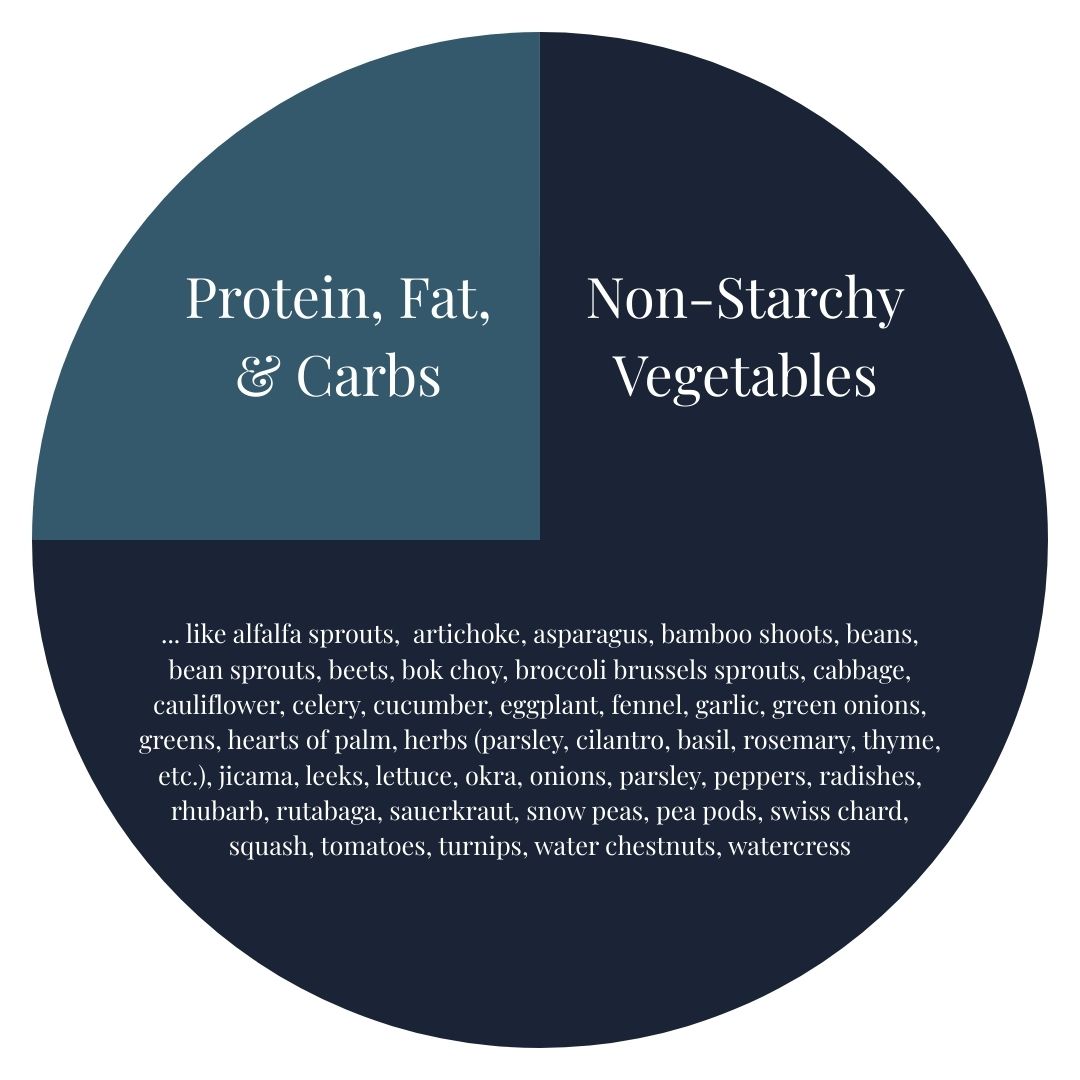
- Non-starchy vegetables should make up three-fourths of your plate.
- Add a serving of protein about the size of the palm of your hand.
- Add healthy fat like oil the size of your thumb (olive oil, coconut oil, flax oil, avocado oil), one handful of nuts or seeds, half to a whole avocado, or one-third to one-half cup olives.
- Add one serving of carbohydrates (½-¾ cup) like pasta, bread, rice or other grains, fruit, starchy vegetables (sweet potato, carrots, beans/legumes, etc.)
- If you notice that you struggle with portion sizes, it can help to use a smaller plate at lunch and dinner.
Making Vegetables Taste Good
Many people think they do not like vegetables because they have not tasted them well-made. Roasting vegetables changed my life; the key is to use some fat. Not only does the fat make the vegetables taste delicious, but it is good for you. Check out this article that explains how eating vegetables with fat enables you to absorb the fat-soluble vitamins better.
Ingredients
- Vegetable(s) of choice
- 1-2 tbsp of fat of choice – coconut oil, butter, ghee, or animal fat (i.e., lard, beef tallow)
- Salt and pepper to taste
Directions
- Preheat oven to 425.
- Spoon fat onto a 9x13 glass pan or cookie sheet with rimmed edges, and place the pan in the oven to melt the fat.
- Cut vegetables into uniform pieces
- Mix vegetables in the melted fat and season with salt and pepper.
- Place vegetables in a single layer on the pan.
- Roast in the oven. Cooking time varies based on the vegetable. For heartier vegetables like broccoli, cauliflower, carrots, and sweet potatoes, cook for 25-30 minutes. Asparagus is 15-20, depending on the thickness. Look for the vegetables to soften (tender when forked) and start to brown on the edges.
- Remove the pan from the oven and let the veggies rest for 5-10 minutes on the hot pan. This helps them to crisp up a bit.
- If you want to make it really tasty, and you tolerate dairy well, serve it with butter.
Chopping Quickly by Hand
Another challenge to making healthy food is time. Learning to chop and dice vegetables is a game-changer. Cutting will go much faster with the proper knife, a little practice, and the following cutting trick. Many people feel more comfortable with smaller knives. But chopping will be more efficient with a big, sharp knife. It can be intimidating, but don’t let that hold you back from trying. Start slowly; before long, you will be chopping like a pro.
Read more ...
 Our bodies are not simple scales balancing calories in and calories out. It has many complex chemical systems that process each ingredient in different ways. Because of this, eating a low-calorie diet is not the best approach to losing weight.
Our bodies are not simple scales balancing calories in and calories out. It has many complex chemical systems that process each ingredient in different ways. Because of this, eating a low-calorie diet is not the best approach to losing weight.
Buzzwords like low-fat, heart-healthy, all-natural, vegan, and gluten-free make us believe that foods are good for us. However, Starbursts are low in fat; Oreos are vegan; and Reese's peanut butter cups are gluten-free. We can't trust claims on labels.
We must look directly at the ingredients. Typically, a shorter ingredient list with words you understand is best. My rule is: "If I wouldn’t want to eat the ingredients plain, then I don't want to eat them all combined in a food-like product." My main concern is my health.
Let's explore ten foods that food manufacturers tricked me into thinking were healthy and how eating real food is more important than counting calories. (Note: I am not picking on the brands below. It's the type of products that concern me.)
Foods I Thought Were Healthy
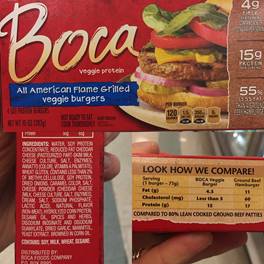 1. Boca Burgers and Veggie Burgers
1. Boca Burgers and Veggie Burgers
Soy patties have less fat and cholesterol than a beef burger, so I thought they were healthier. Now, I am confident that grass-fed burgers are a much better choice.
We need healthy fats and protein. Since the cholesterol in food does not play a substantial role in determining the body’s cholesterol levels, we don't need to be afraid of red meat.
Soy patties also have a long ingredient list with fillers. Grass-fed burgers from a healthy cow that walked around and ate its natural diet while alive are made from only one ingredient: beef. It is nutrient-dense and makes an excellent choice.

2. Fruit-flavored yogurt
This was my breakfast every morning. I thought it must be healthy since it was only 80 calories. Now, I avoid “naturally and artificially flavored” whenever possible. I get plain yogurt and add berries.
I also prefer to get full-fat yogurt. Milk naturally contains fat, so I want to keep it that way. We need to eat healthy fats to produce hormones. It also helps us feel full, maintain energy, stabilize blood sugar, and help with insulin resistance.
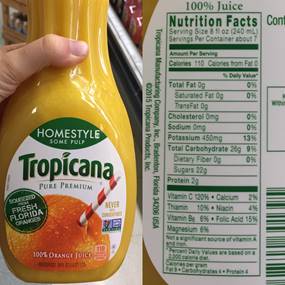 3. Orange Juice
3. Orange Juice
Orange juice was my favorite beverage growing up. Who doesn’t love 26 grams of carbohydrates to start their day?
Unless you are SUPER active, most people will gain weight and struggle with blood sugar control if they have over 150 grams of carbs. With a glass of OJ, you are already 17% there (not including the 30+ grams you might eat in the cereal, bagel, or toast alongside the orange juice).
A typical orange has 11 grams of carbohydrates. The membranes between the segments contain fiber, which fills you up and keeps you more satisfied. This principle is true for all juices, so consider it when you want apple, cranberry, or any other juice.
Read more ...
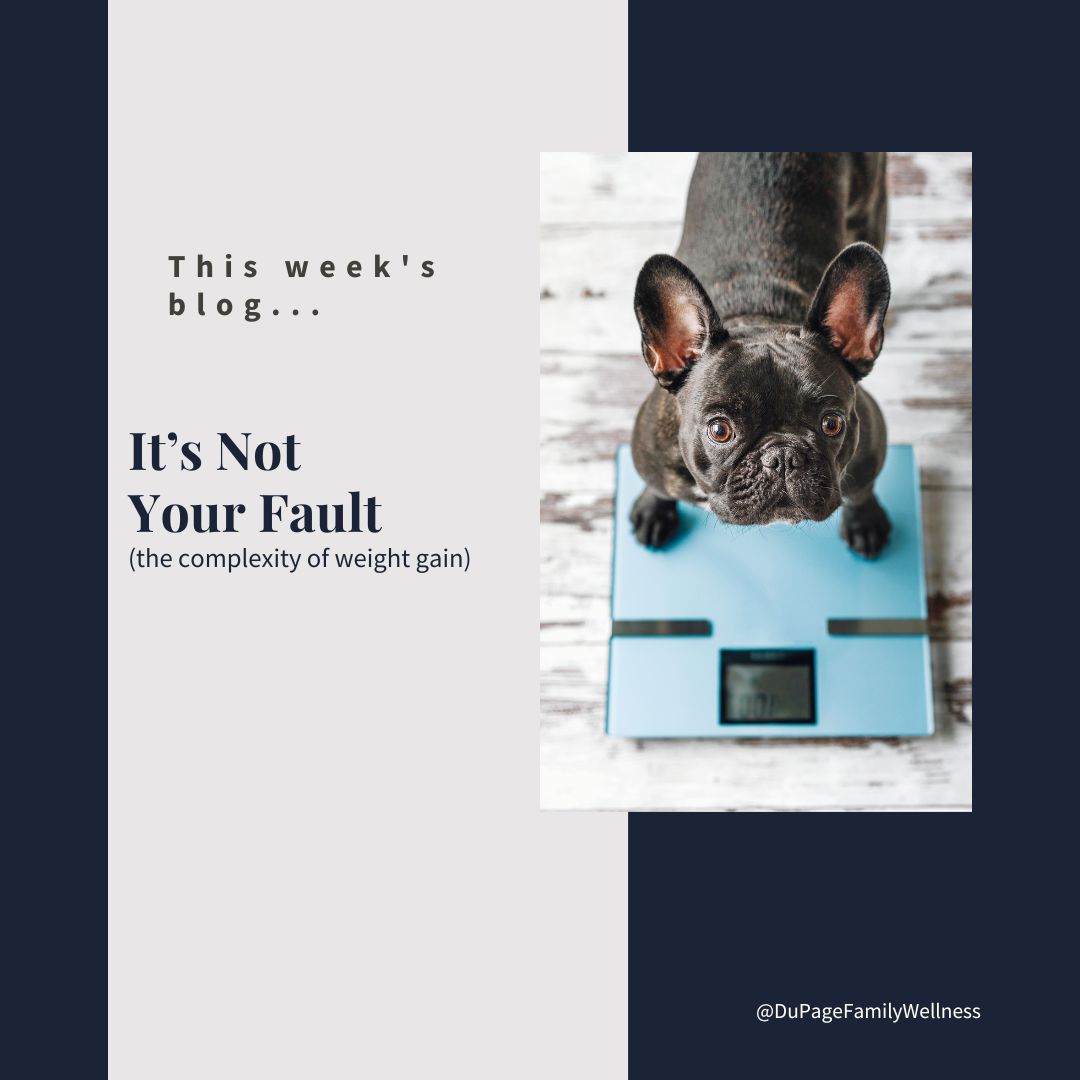 It is thought that if we eat too much we will gain weight, but the truth is much more complex. A simplistic view often causes a lot of shame for those who are struggling with their weight.
It is thought that if we eat too much we will gain weight, but the truth is much more complex. A simplistic view often causes a lot of shame for those who are struggling with their weight.
Our society is changing, but historically there has been a lot of judgment and criticism of people who are on the heavier side. This is unfair because many factors influence a person’s weight.
Investigative science, health journalist, and author Gary Taubes says, “We don’t gain weight because we’re eating more. We’re eating more because we’re gaining weight.” Other factors, not just willpower, need to be brought into the conversation.
Let’s take a more in-depth look at this issue so that we can more effectively address it.
Evolution
As humans, we are designed for survival. In the past, eating lots of high-calorie food helped our ancestors survive. For our hunter and gatherer ancestors, it was difficult to find or kill enough calories in some seasons.
When food was available, they did not let food go to waste. It was in their best interest to eat as much as they could, so willpower was not needed. After all, it could be a while before they had access to food again. Unfortunately, this survival instinct does not pair well with our current environment. For many of us, food is no longer scarce. Fatty, sweet, salty, decadent snacks abound. Most of the time these snacks are highly processed and not healthy. Nowadays we even have food scientists specifically working to make these foods addicting.
You may beat yourself up for not having the willpower to avoid these snacks, but it is not your fault. Generation after generation, you were wired to WANT to eat calorie-dense food when it was available. It was crucial for your survival. The best way to combat this is by keeping foods that you do not want to eat out of your environment. Relying on willpower may work for a while, but it is not a great long-term plan. If you have to run to the store to buy something, you will be less likely to eat it than if you just need to go to the kitchen.
Inflammation
Gaining body fat causes inflammation which has a profound impact on brain function. According to neurologist David Permutter, inflammation changes brain wiring and keeps us “out of the prefrontal cortex and locking us into impulsivity.”
The prefrontal cortex is the part of your brain responsible for executive function. It is the decision-making center of the brain. When excess inflammation is present, it sets off a cycle that ultimately disconnects us from making good decisions.
Inflammation also impacts the quality of our sleep, which leads us to more impulsivity. David Perlmutter, author of Brain Wash, states that “people who chronically don’t sleep well will consume, on average, approximately 380 calories more each day, without a similar increase in energy expenditure.”
So, gaining weight leads to low-quality sleep, which leads to inflammation, which leads to impulsivity, which leads to more weight, which leads us to lower-quality sleep, and the cycle begins. In addition, the changes in the brain due to inflammation impact the ability to make wise decisions to break the cycle.
Breaking the Cycle
In Brain Wash, Perlmutter describes the concept of off-ramps, which are ways to disengage from these negative cycles. These off-ramps are designed to give us back control and include things such as prioritizing sleep, mindfulness, and connection.
When we understand the way we have gotten caught in a cycle, we can choose to make different decisions. Even little changes can help break the cycle and gain more control, which leads to more good decisions.
Permutter encourages giving yourself “credit for the healthy choices you make - even the small ones - and try to let go of any stress you feel if you make a misstep. Stress can be just as detrimental to your health as a junk food binge.”
Here are some things you can try this week.
Read more ...
 I'm doing Whole30 for January with my husband Jared. Whole30 involves eating only "meat, seafood, and eggs; lots of vegetables and fruit; natural, healthy fats; and fresh herbs, spices, and seasonings" for thirty days (The Whole30 Program).
I'm doing Whole30 for January with my husband Jared. Whole30 involves eating only "meat, seafood, and eggs; lots of vegetables and fruit; natural, healthy fats; and fresh herbs, spices, and seasonings" for thirty days (The Whole30 Program).
I am currently on day 15, and here are a few of the biggest things I've noticed:
- My clothes are fitting better
- My skin isn't as dry.
- TMI for some of you, but my bowel movements have improved according to the Bristol Stool Chart that we have chatted about before.
- My tooth/gum sensitivity has improved. I noticed this symptom immediately after giving birth to Izzy when brushing my teeth. My best guess for why it improved is the same as why my bowel movements have improved- the mouth is after all the very first part of the digestive tract. Yay for decreased inflammation everywhere!
- My children bring me lots of food items that they don't finish and expect me to eat them (because I have always done this- think sandwich edges, parts of bagels with cream cheese, pizza crusts, a few ounces of milk or juice several times a day, etc.)
- As much as I aspire to eat lots of vegetables, we had gotten really comfortable eating much more of what I consider more nutrient-poor filler foods like pasta, rice, bread, etc. several times each week. I am really loving being back to consuming more vegetables with every meal
- It is much easier to do this with my husband on board than it would be doing it on my own. My kids aren't doing the whole30, but are likely benefitting from the meal prep we have been consciously doing so far this month.
While this will take self-control, Whole30 does not encourage you to limit your food intake or count calories. It focuses on eating quality food until you are satisfied. So, the hardest thing about eating this way is finding the time to make this healthy food.
Mealime has been one of my favorite tools; it is an app that takes some of the mental load out of finding great recipes, meal planning, and grocery shopping. Finding shelf-stable snacks that taste great and are free from ingredients we do not want in our bodies has also been imperative. Paleovalley beef sticks are snacks we feel good about having between meals.
Let me share some things that helped us make this happen.
Whole30
The Whole30 is not intended for weight loss; it is an elimination diet designed to help you identify food sensitivities, create new habits, and reestablish a healthy relationship with food.
The first phase of Whole30 involves only eating meat, seafood, eggs, vegetables, fruit, healthy fats, fresh herbs, spices, and seasonings. You are not encouraged to count or restrict calories, limit portions, or keep a food journal
The ten-day reintroduction phase follows. In this phase, food groups are introduced in a specific way that allows you to notice any symptoms that may be associated with it. You can find all the details at the Whole30 Program.
Who Would Benefit?
If you are tired all the time, have trouble with sleep, struggle with digestive issues, consistently feel achy, or suffer from other unwanted symptoms (acne, migraines, asthma, allergies, anxiety, etc.) this program may be good for you. Even “healthy” foods can strain your physical and mental health and keep you from feeling great. The Whole30, helps you do a 30-day experiment to see how specific foods impact the quality of your life.
It also is a great reset for those who want to improve their relationship with food. However, it is NOT advised for anyone who has struggled with an eating disorder - regardless of whether it was formally diagnosed or not. If you have ever wondered if you have an eating disorder, please talk with a healthcare professional before starting any eating program. In fact, talking with your healthcare provider is good for everyone.
Mealime
The Mealime app (We use the free version) has been a game changer. I find my recipes by selecting the Paleo option and indicating no dairy, soy, or corn. Most recipes with these filters are Whole30 compliant, but sometimes I make minor adjustments like skipping maple syrup or honey. You can set it up for 2, 4, or 6 servings of each meal. We choose 6, and this typically will get us dinner for the whole family plus an extra lunch serving for Jared and I.
After selecting the recipes, Mealime creates the meal plan and provides a grocery list of everything you will need to cook your meals. The grocery list is incredibly user friendly, and I can check off items that we already have, and while shopping, can check off items as they are added to the cart. We haven't used this feature, but it is integrated with multiple online shopping options which you can choose to pick up or have delivered.
Jared and I both have the app on our phones, and log in under my log in. This way we can each select meals, access the shopping list, and see the recipes. This lets either one of us cook the meal depending on what works best on a given night.
Here are some of the recipes we have tried…
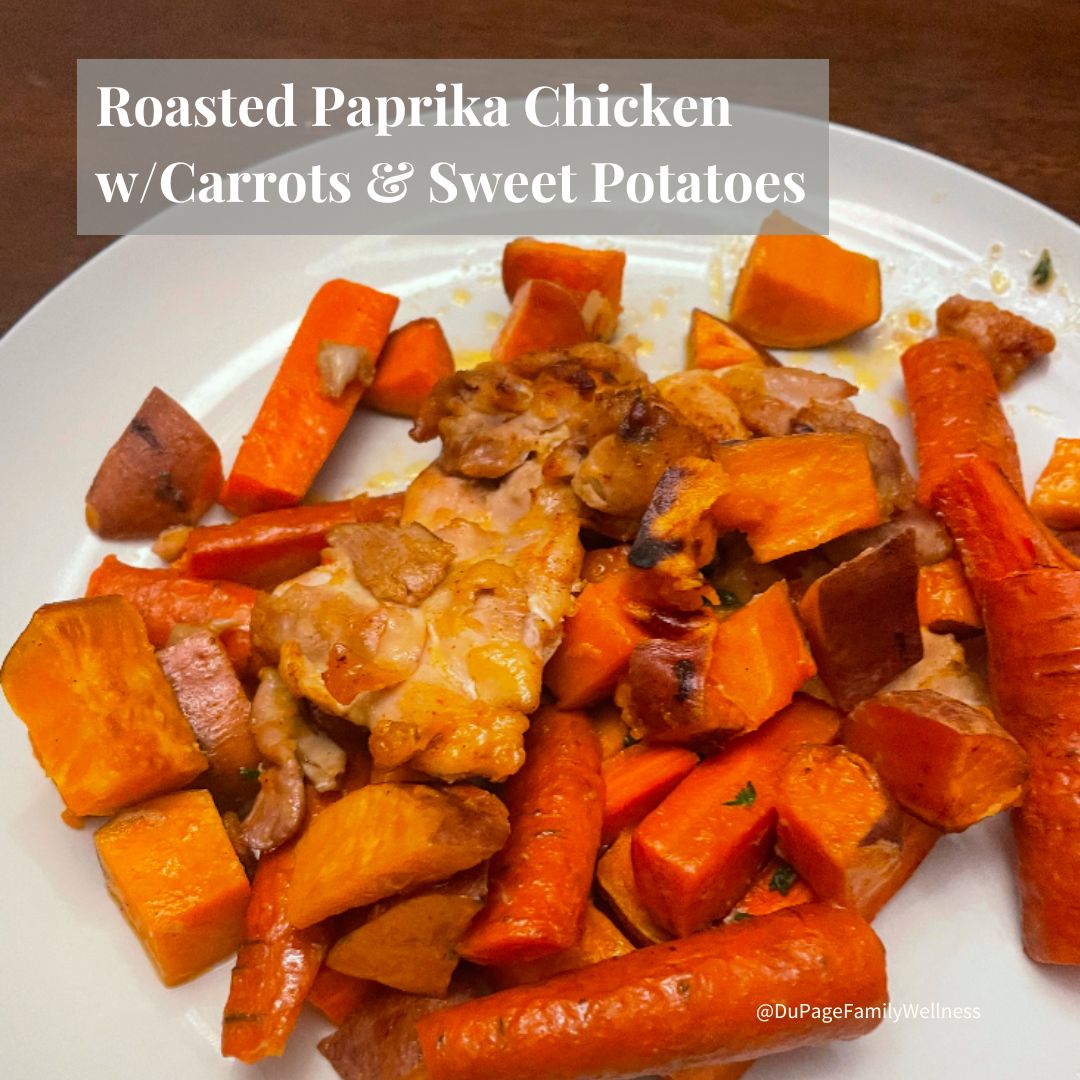

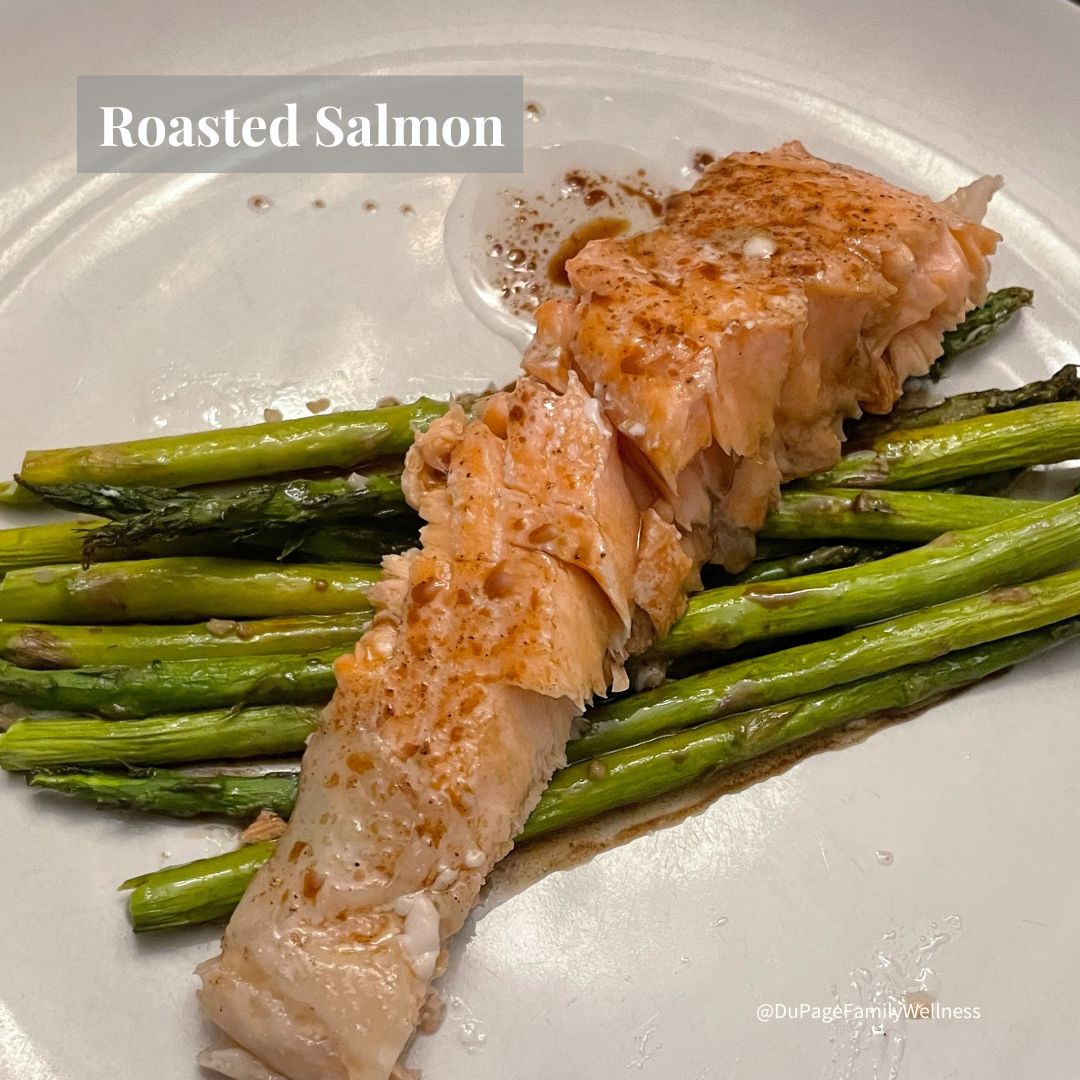
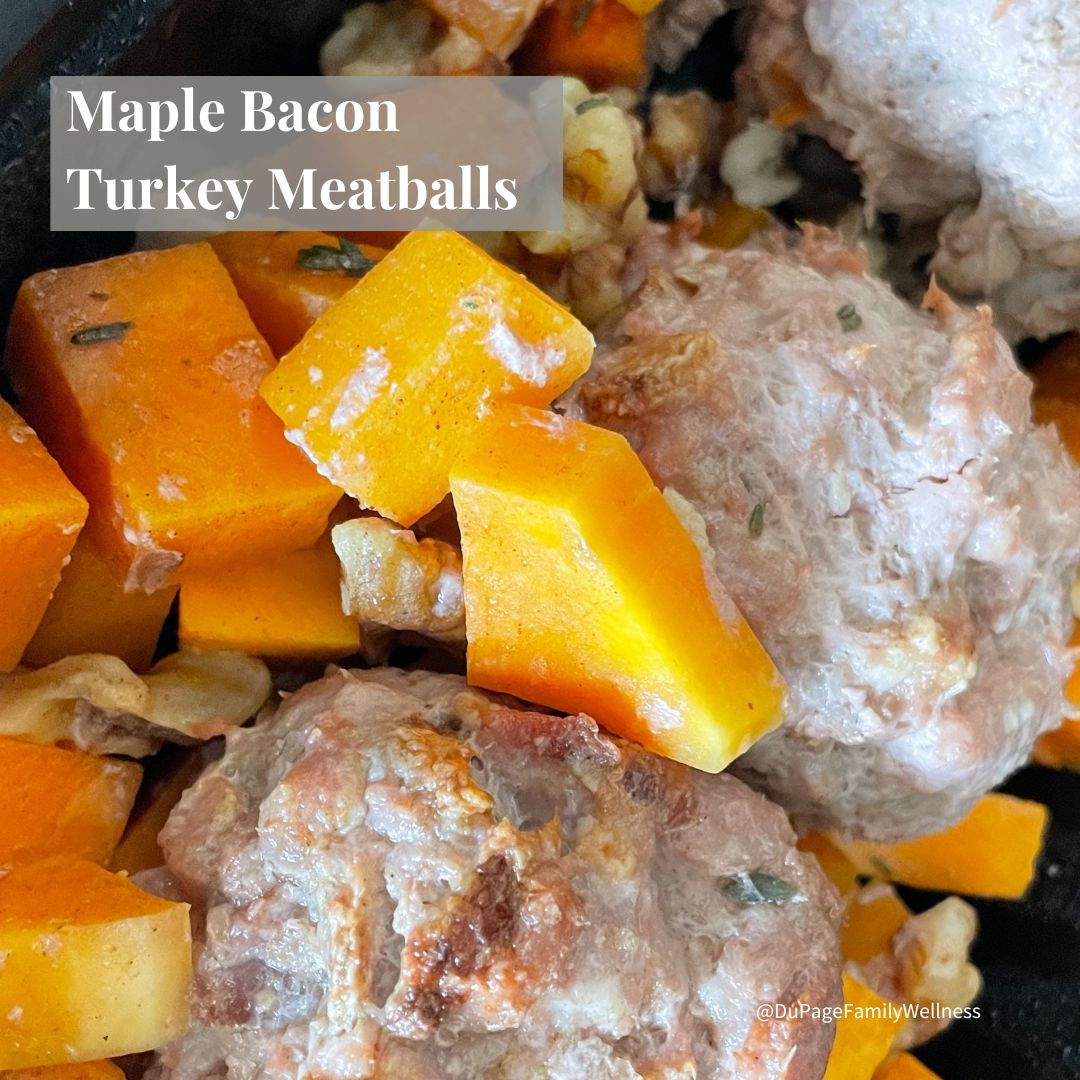
A Great Whole30 Compliant Snack
Paleovalley’s mission is to offer nutrient-dense products that can enhance health, made with integrity and free from harmful ingredients. My family loves the Paleovalley Beef Sticks. My kids prefer the original and the garlic summer sausage, but I like all the ones we have tried. You can also choose pasture-raised chicken sticks, grass-fed venison sticks, or pasture-raised pork sticks.
Paleovally also makes superfood bars, organic supergreens, grass-fed bone broth protein, grass-fed whey protein, electrolytes, superfood golden milk, organic coffee, olive oil, and spices.
You can see the details about their products at Paleovalley.com
If you want to hear more about my Whole30 experience, just ask at your next appointment!
Dr. Jamie
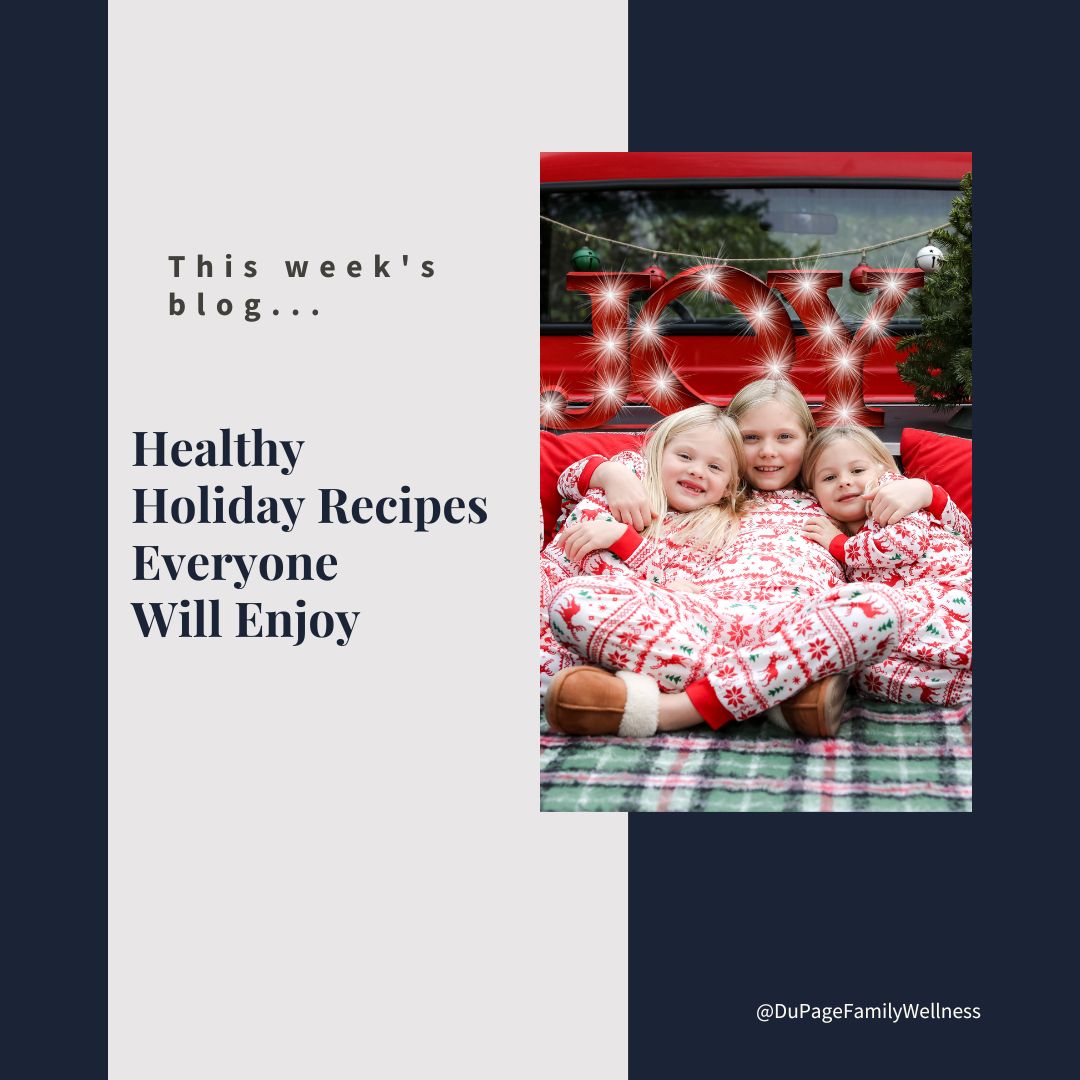 Most people have special traditions during the holidays. They may drive around looking at the lights, make gingerbread houses, and, most importantly, spend time with loved ones. Many people's traditions include specific foods they eat at their holiday meal.
Most people have special traditions during the holidays. They may drive around looking at the lights, make gingerbread houses, and, most importantly, spend time with loved ones. Many people's traditions include specific foods they eat at their holiday meal.
Here are some great recipes for healthier versions of traditional dishes. Since they are delicious and nutritious, you shouldn’t feel sluggish afterward. Hopefully, you will have lots of leftovers to enjoy eating in the following days.
Main Course
Paleo Whole 30 Roasted Turkey - Real Food with Jessica
Holiday Spiced Orange Glazed Ham - PaleOMG
Sides
Paleo Sweet Potato Casserole {GF, DF} - The Paleo Running Momma
Bacon Wrapped Green Bean Bundles (Paleo, Keto) - I Heart Umami®
Roasted Garlic Mashed Cauliflower Recipe - Evolving Table
Paleo Dinner Rolls Made with Tapioca or Arrowroot Starch & Coconut Flour (ourpaleolife.com)
Desserts
Paleo Sugar Cookies - Gluten-Free Baking (glutenfreebaking.com)
Vegan Christmas Crack (paleo, gluten-free) - Pure and Simple Nourishment
I would love to hear your favorite healthy recipes that you’ll be making this year!
Dr. Jamie
*Photo credit: Becci Hethcoat Photography
 It seems everyone has a favorite Halloween candy. The most popular candies in Illinois are Sour Patch Kids, Kit Kats, and Starbursts. My favorite traditional Halloween candy is Reese's Peanut Butter Cups. What about you?
It seems everyone has a favorite Halloween candy. The most popular candies in Illinois are Sour Patch Kids, Kit Kats, and Starbursts. My favorite traditional Halloween candy is Reese's Peanut Butter Cups. What about you?
Americans bought 600 million pounds of Halloween candy last year. This excessive candy intake is so ingrained in our culture that we may not think much about it, but what is it doing to our bodies?
Halloween is the first in a series of high-sugar holidays. It is also around the start of the dreaded flu season. Could there be a connection between these things? After all, sugar wreaks havoc in our bodies.
Let’s make a plan so you can enjoy the holidays in a way that cares for your physical body too.
The Flu Season Myth
Why do we see more flu cases during the fall and winter months when germs for the flu are around all year? I love how Dr. Angie Elliot explains this phenomenon in her article “There’s No Such Thing As ‘Flu Season’.”
Elliot asks us to consider what would happen if we plant a seed without offering it water, light, or air. Would it grow? No, it would not be able to grow under those conditions. Next, she asks us to "consider your body equivalent to soil and a virus or bacteria as the seed. If you planted that seed in your body right now, could it grow?" She explains, "Many people get sick with colds or the flu this time of year because the condition of their body is primed for pathogens to thrive and grow.”
Things That Stress the Body
Once you identify factors that impact your immune system, you will be empowered to create an environment where germs can NOT thrive. Some things are obvious, while others are more subtle; you may not even realize they are causing harm.
- Lack of Sleep
- Dehydration
- Mental & emotional stress
- Financial stress
- Relational stress
- Vitamin & mineral deficiencies
- And sugar!
As the holidays approach, these factors tend to increase. The demands of the holidays may cause tension in our relationships and keep us from getting the sleep we need. Holiday treats and alcohol may replace things that would be better for our bodies.
Finding Balance
Striving for balance and making decisions intentionally can help us enjoy the holidays. Consider the list above and think about your greatest challenges during the holidays. Perhaps you are constantly fatigued and would benefit from saying "no" to some activities. Maybe stress impacts your relationship, and it could help to set aside time for those you love. If there is a strain on your finances having a conversation about expectations might help.
One of the biggest struggles at Halloween can be the candy. Sugar causes an inflammatory response, and when the body is chronically inflamed it suppresses the immune system. This leaves you vulnerable to infection and disease. Sugar also creates unbalanced gut bacteria, which affects your immune system. Since 70-80% of your immune system is based in your gut, it is crucial to have a balance of healthy gut bacteria.
Remember, we want to be intentional and strive for balance. We do not want to get into an all-or-nothing mindset. The following ideas can help you come up with a plan that feels right to you.
What to do About Halloween
Here are some things that you can do to have a healthier Halloween. (Consider picking even 2-3.)
Read more ...
 Many people want to eat nutrient-dense foods but struggle to make it happen. Finding a way to fit healthy eating into your lifestyle is crucial.
Many people want to eat nutrient-dense foods but struggle to make it happen. Finding a way to fit healthy eating into your lifestyle is crucial. 


 Our bodies are not simple scales balancing calories in and calories out. It has many complex chemical systems that process each ingredient in different ways. Because of this, eating a low-calorie diet is not the best approach to losing weight.
Our bodies are not simple scales balancing calories in and calories out. It has many complex chemical systems that process each ingredient in different ways. Because of this, eating a low-calorie diet is not the best approach to losing weight. 


 It is thought that if we eat too much we will gain weight, but the truth is much more complex. A simplistic view often causes a lot of shame for those who are struggling with their weight.
It is thought that if we eat too much we will gain weight, but the truth is much more complex. A simplistic view often causes a lot of shame for those who are struggling with their weight. I'm doing Whole30 for January with my husband Jared. Whole30 involves eating only "meat, seafood, and eggs; lots of vegetables and fruit; natural, healthy fats; and fresh herbs, spices, and seasonings" for thirty days (The Whole30 Program).
I'm doing Whole30 for January with my husband Jared. Whole30 involves eating only "meat, seafood, and eggs; lots of vegetables and fruit; natural, healthy fats; and fresh herbs, spices, and seasonings" for thirty days (The Whole30 Program).
 Most people have special traditions during the holidays. They may drive around looking at the lights, make gingerbread houses, and, most importantly, spend time with loved ones. Many people's traditions include specific foods they eat at their holiday meal.
Most people have special traditions during the holidays. They may drive around looking at the lights, make gingerbread houses, and, most importantly, spend time with loved ones. Many people's traditions include specific foods they eat at their holiday meal. It seems everyone has a favorite Halloween candy. The most popular candies in Illinois are Sour Patch Kids, Kit Kats, and Starbursts. My favorite traditional Halloween candy is Reese's Peanut Butter Cups. What about you?
It seems everyone has a favorite Halloween candy. The most popular candies in Illinois are Sour Patch Kids, Kit Kats, and Starbursts. My favorite traditional Halloween candy is Reese's Peanut Butter Cups. What about you?